
Alexandria’s School Board is starting to kick off plans for redistricting and some of the early discussion has been around a unique and controversial placement regulation in Alexandria City Public Schools (ACPS): capacity reassignments.
Capacity reassignments allow the superintendent to put caps on the number of students at a school and reassign students to other schools if that limit is reached.
According to the ACPS regulations:
Each year by April 1, the Superintendent will publicly present the projected number of students by school and by grade level for the following school year. The Superintendent and School Board will review proposed class size caps and the number of homeroom sections for each school at each grade level during the budget process each spring.
Under certain conditions listed in Policy JC/JCD, the Superintendent may place restrictions limiting the assignment of elementary students to a particular school or grade level based on capacity. If an enrollment limit for a grade level is reached, the Superintendent or authorized designee may reassign elementary students to the school closest to the student’s residence where there is capacity. Because ACPS transportation resources and utilization impact placement procedures, “school closest to the student’s residence” is determined by the shortest driving distance (mileage).
Capacity reassignments move students away from the schools closest to them to cut down on classroom sizes.
At a work session last week, staff told the Redistricting Steering Committee that one of the suggestions in this year’s redistricting discussion is the elimination of capacity reassignments, noting that no other school division has a system like ACPS’.
School Board member Abdel Elnoubi said eliminating capacity reassignments would require a different set of solutions, like trailers at schools.
“We continue to not want to put that idea on the table,” Elnoubi said. “We can’t have it both ways. If we’re going to eliminate capacity assignments, we need to be open to other solutions… we need to start thinking creatively.”
Elnoubi also said removing class size caps would increase inequity in Alexandria schools.
“Heck no, I would never support removing class size caps,” Elnoubi said. “This is going to increase inequities.”
School Board member Meagan Alderton said the School Board will have to make unpopular decisions to address capacity issues.
“I feel like our biggest problem when you look at all of these things: we don’t want to change with the times,” said Alderton. “We want to stay a small town. We love our little city on the hill, but that’s not where we are. We are continuously trying to fit a square peg in a round hole, and this is why we’re having all these issues.”
Alderton said School Board members “have to take the heat over something.”
Policy revisions are the focus of the Redistricting Steering Committee this spring. From Aug. 2024 to May 2025, options will be developed and ACPS will gather community feedback. Recommendations are scheduled to come back to ACPS for a vote sometime between June-December 2025.
Once the new redistricting policies are approved, families will be notified of the impact between January and July 2026, with the new boundaries implemented for the 2026-2027 school year.
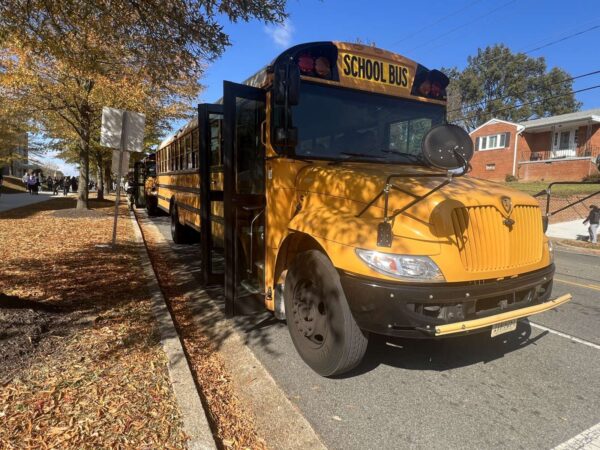
The Alexandria School Board unanimously approved a collective bargaining resolution Thursday night, setting the ground rules for how the school system will negotiate with staff on wages and benefits.
Dawn Lucas, president of the Education Association of Alexandria, was pleased with a number of changes that she recommended the Board make to the proposed resolution.
“I feel like we’re in a good place,” Lucas said. “Our teachers and staff are going to have seats at the table, and their voices will be heard.”
School Board Chair Michelle Rief said that Alexandria City Public Schools wants to come to a collective bargaining agreement by the end of 2024.
“I think it’s a milestone moment for our school division,” Rief said. ” I want to thank the Education Association of Alexandria, our ACPS staff and community members who were engaged in this process. We heard your feedback, we incorporated your feedback and I’m very pleased with where we landed with this final collective bargaining resolution.”
The school system is currently experiencing a staffing crisis. Last October, EAA sent the Board an employee certification on behalf of licensed teachers. That submission gave the Board 120 days to adopt a framework for the resolution.
Among the changes to the draft document was Board Member Abdel Elnoubi’s recommendation to remove a 30% voting threshold for employees to establish two unions for bargaining. Those units can now be chosen with a simple majority of staff.
Elnoubi said that the Board’s work on the resolution was the best experience he’s had throughout his single term.
“I got to roll my sleeves and do work and get involved in the work from the beginning and be part of the process,” Elnoubi said. “I don’t think as board members we get to do that a lot, so that was a really good experience, to feel that we are actually solving problems and working hands-on.”
The Board also increased the number of yet-to-be-determined bargaining topics from four to six, and left the door open for more topics if voted on by the bargaining units. Additionally, after the first agreement expires after three years, collective bargaining to administrative staff.
ACPS middle school teacher David Paladin Fernandez was also pleased with the resolution. Fernandez is running against Lucas for EAA president in a union election this summer.
“I do appreciate the immense amount of work that the Board has done to improve this document from where it was last week when it was first released,” Fernandez said. “The fact that they struck out the voter participation threshold is a tremendous win for not just employees here in ACPS, but for Democracy itself.”
The final touches are being made to Alexandria City High School’s expansion of its Minnie Howard Campus.
The five-story, $174 million high school project is on-budget and on-track for “substantial completion this spring,” according to an Alexandria City Public School staff report that will be presented to the School Board on Thursday.
“Construction of the new Minnie Howard building has been ongoing since the spring of 2022 and is on track to be substantially completed this spring for occupancy in August 2024,” staff wrote.
The 1,600-student school, which nearly doubled in its capacity, will feature an aquatics facility and expanded career and technical education (CTE) lab spaces for “potential new offerings in game design/development, robotics, emergency medical sciences, cyber security, (and) firefighting,” according to ACPS.
Staff also reported that construction the gymnasium and auxiliary gym are complete, that furniture is being moved in and that interior finishing touches are being made.
Next steps for the project include inspection by the Health Department and getting a final occupancy permit.
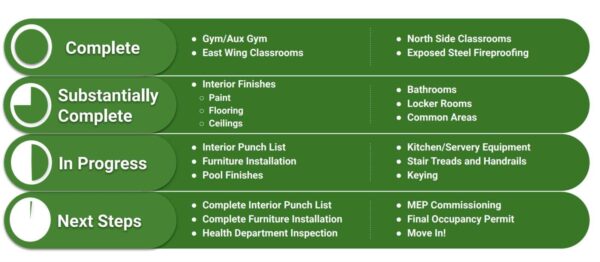
Alexandria School Board Members went all-in Wednesday night in asking City Council to fund its budget by approving a massive tax increase.
Mayor Justin Wilson told the Board at a budget work session on Wednesday night that its fiscal year 2025 $384.4 million combined funds budget request would result in a historic tax increase. The Board, in turn, said that the funding could stem the school system’s staffing crisis.
“To be candid, the combination of the operating requests and the capital requests is probably about a 6 cent tax increase, which is not viable,” Wilson said, adding that it would be the largest tax increase since the 5.7 cent tax increase of 2017 raised the average residential property tax bill by more than $300.
The Board’s proposed budget, which was approved last month, surprised Wilson and other Council Members, who said they were left in the dark with its development.
“I’ve heard nothing around a strategic look at how we pay folks,” City Council Member John Taylor Chapman told the Board. “I know many of you personally. I know you care about what you do. I know you are professionals. So, when I say ‘Hey, I expect you to bring a great budget to Council and Council is going to fund it,’ I don’t expect you to be just willy nilly. I expect you to be focused and I think that’s who you are.”
School Board Chair Michelle Rief countered that the Board has been strategic in its thinking, and that she prioritizes the 2% market rate adjustment for staff as the most important addition that needs funding.
“In my opinion, to sort of go out publicly and tell us to fight for the thing that we need and then come here and tell us that we’re we’re asking for too much, I think might be a political strategy on your part,” Rief said.
Vice Mayor Amy Jackson, who is running for mayor, said that the city should raise taxes to fully fund the school system’s budget request.
“I know it’s a sacrifice for all of us,” Jackson said. “I mean, we all live here in the city, and raising taxes would be a sacrifice.”
Jackson was the only Council member to not criticize the school system’s budget during the meeting.
“I just feel like we need to get close to what they’re asking for, if not fully funded,” Jackson said. “I think raising taxes also will mean that hopefully we’re not cutting our services and that our services are remaining at the optimum level for our residents and our businesses, but also making sure that our schools are remaining competitive and keeping our community stronger.”
School Board Member Tammy Ignacio was brought to tears while recounting the stresses that staff and students are experiencing.
“We have got to be able to compete with our surrounding jurisdictions,” Ignacio said. “In my 32 years in education, I have never seen it this bad. I have never seen the level of kids in a classroom without a teacher in front of them.”
City Council will set a maximum tax rate next week, allowing the City Manager to pursue some of the Board’s proposed additions, which include $4.2 million for staffers who did not get step increases in fiscal year 2021 and a $5.4 million (2%) market rate adjustment for all eligible staff.
Council Member Alyia Gaskins, who is running against Jackson in the Democratic mayoral primary, said she is in favor of advertising a higher tax rate to consider the additions.
“We have to deliver a balanced budget that responds to the needs of our community and that means doing right by our teachers and students,” Gaskins said. “If in the end we decide an increase is necessary, then I will be leading the charge to figure out relief for those who cannot keep affording these increases, like seniors on fixed incomes or others who are one tax increase away from not being able to afford to live here.”
School Board Member Abdel Elnoubi, who is running for City Council, said that he’s asking them to make an unpopular decision during an election year.
“It’s your decision to decide whether you want to raise taxes or not,” Elnoubi said. “If you do that, if you decide to raise taxes, I’m 100% with you… Let me just address the elephant in the room. It is an election year and as a School Board Member I’m in a less tough position.”
Four City Council Members are seeking reelection, and two members are running for mayor. Elnoubi and School Board Member Jacinta Greene are also running in the June 18 Democratic City Council primary.
Elnoubi said that from Council’s perspective, the Board gets to take credit for the increased funding while City Council has to deal with the consequences of raising taxes.
“That’s very viable, that is the political reality of things,” Elnoubi said. “What I will tell you is we are doing what we think is right for the school system… I would be derelict in my duty if I don’t ask you for what we need, understanding full well you may not be able to give it to us, which is fine.”
Wilson said that the Board needs to work closer with Council to craft not only this budget, but future budgets.
“It is impossible for us to resolve the gap on both the capital and operating side,” he said. “So we are going to pick a number and to come to some conclusion to our process, and it’s going to be challenging to arrive at that number without some really good input from the School Board as to what that should be.”
School Board Member Tim Beaty said that living in the city is becoming more expensive, and that the additions are focused on teacher retention.
“We were doing what we thought was best in order to keep the quality of what we’ve got,” Beaty said. “I’m frustrated that this leads to this huge difference between what we need and what’s available in the budget.”
City Council will adopt its final budget on May 1.
ALXnow will be running a series of City Council candidate interviews through the local election filing deadline on April 4.
The economic potential for the $2 billion Potomac Yard arena deal is maintaining the interest of Alexandria City Council Member Alyia Gaskins.
Gaskins is running for mayor and says that a good deal for Alexandria means more city representation on the Virginia Stadium Authority board, which would own and finance the future home of the Washington Wizards and Washington Capitals.
Gaskins says that she’ll carefully dissect the proposal “if and when” it comes before City Council and that her four key issues are on the city’s representation on the Virginia Stadium Authority board, as well as how the project impacts labor, housing, and transportation.
“A good deal is one that has strong labor protections, a commitment to affordable housing and new transportation investments,” Gaskins told ALXnow. “It is also one in which we have the majority of authority on the, but the majority of seats on the stadium Authority Board.”
A House version of the bill to create the board was approved earlier this month, but the Senate version of the bill is currently stalled.
“As you know, I’m the one who’s going to be in the weeds going through each and every page to really evaluate what has come to us and is it something that’s going to deliver for Alexandria,” Gaskins said. “I can’t speculate now until I see specifically where we are on each of those areas, because I don’t think it works without all of them.”
On the issues
Gaskins said she had to take a pause and that she was disappointed after seeing the Alexandria School Board’s recent budget request. The Board asked for $21 million more than what was allocated from the city in last year’s budget, prompting an outcry from Mayor Justin Wilson, and a fiscal year 2025 budget proposal from the City Manager that does not include $10 million in additions from the School Board.
Gaskins said that City Council was briefed in the fall about a potential reduction in real estate values, and that the decline would mean a substantial revenue reduction in the city, potentially resulting in cuts to city services.
“I thought seeing then a budget that calls for such an addition at a time when we are facing some tough economic situations was really a little disappointing,” she said. “At the same time, we all are fighting for the same thing. We want our teachers to be the best paid, and to be the most supported in the region. We want our kids to have the greatest academic outcomes that they can achieve. Our two bodies will have to figure this out, starting tonight at our work session.”
Gaskins also said that the city needs to pause as it evaluates the second phase of its zoning for housing initiative. Last year, City Council controversially its upended its residential zoning policies by eliminating single family zoning. She said that the first phase focusing on housing production and that the city also needs to look at homeownership programs, tenant protections and preventing housing displacement should be refined.
“I don’t think we need to add anything else,” she said. “We need to focus on doing that and doing that well.”
On the double-digit Virginia American Water rate hikes, Gaskins said that she wants to get retroactive refunds for residents who may see their water bills significantly hiked.
“I think it’s excessive and it could be harmful to our residents,” Gaskins said of the increase. “The numbers I’ve seen show that if this rate goes through as planned, some of our residents could see upwards of a 50% increase in their bills.”
On public safety, Gaskins said that the citywide uptick in violent crime is “unacceptable,” and that the Alexandria Police Department needs to create a strategic plan that “clearly articulates” how it is being tackled. She also said that the recently released community crime map will help residents understand what’s happening.
“It’s not just uncomfortable, I think it’s unacceptable,” Gaskins said. “And I think that communication between our public safety professionals and our residents is an important piece of our crime prevention strategy that has to be strengthened.”
About Alyia Gaskins
Gaskins, who was elected to City Council in 2021, is running in the Democratic primary on June 18. She’s married with two young children and moved to the with her family from Fairfax County in 2016. She’s been a senior program officer at Melville Charitable Trust for three-and-a-half years, before which she worked as a a public health strategist with the Center for Community Investment and the National League of Cities.
She’s a native of Pittsburgh, Pennsylvania, and was raised by her single mother, Francine Smith, and her paternal grandmother Marilyn Parker. Gaskins said that her mom regularly worked two or three jobs at a time, mostly as a paraprofessional and librarian at Pittsburgh Public Schools.
Parker died last month, and Gaskins said that the loss has been difficult.
“It’s definitely been hard, because every big moment I can think of in my life, my grandma has been by my side,” she said. “I think the only kind of saving grace is she taught and she instilled in me a faith and a joy that surpasses understanding. And so when the days are hard, I can still smile because I know I know she’s with me.”
If elected, Gaskins will be the first Black female mayor of Alexandria.
“When I think about what it would mean to be the first Black female mayor, honestly, sometimes I can’t even put it into words, like it’s something that is overwhelming,” she said. “It’s something that is humbling, and it’s something that would fill me with tremendous joy.”
Gaskins has a bachelor’s degree in medicine, health and society from Vanderbilt University, a master’s in urban planning from Georgetown University, and a master’s of public health from the University of Pittsburgh and a certificate in municipal planning from the University of Chicago.
She was elected to City Council in 2021, and previously served on the city’s Transportation Commission, where she said that her experience with the Seminary Road bike lane controversy convinced her that the city needs to improve outreach to impacted communities.
Communication-wise, Gaskins said she had no notice from Mayor Justin Wilson when he announced he wasn’t seeking reelection on Dec. 1. She announced her intention to run on Dec. 4, as did her fellow Council Member Vice Mayor Amy Jackson.
“I had no special inside knowledge or anything like that,” Gaskins said. “What I watched over the past several months is what Justin has said, that he’s thinking about it and we’ll find out the decision. I thought to myself, I’m going to be ready no matter what that decision is. I want to be ready to run.”
Gaskins is leading in fundraising among her Council colleagues, raising $46,000 with $34,000 on-hand as of Dec. 31, according to the Virginia Public Access Project. Jackson has raised $16,900, and has $15,800 on-hand. The next financial disclosure deadline for the candidates is at the end of this month.
Gaskins says that she gets four-to-five hours of sleep on a good day, and that her family is committed to seeing her conduct city business.
“What I do think I’ve been able to create in my life and will do as mayor is a harmony where I have found a way for all of the pieces to work together,” she said. “I recognize the demands that will be on my time, then it makes sense that will be on my family’s time. But this is something that we are fully committed to doing as our unit and making sure that as a unit we can serve and continue to deliver.”
The Democratic primary is June 18.
I'm running for Mayor to build an Alexandria that works for all of us. Watch, share, and join our grassroots campaign today! pic.twitter.com/hGf80NTjDV
— Alyia Gaskins (@Alyia4ALX) December 4, 2023
Join hosts Pat Miller & Gayle Reuter for a kid-friendly Meet & Greet in Del Ray with Alyia this Saturday, March 9th. RSVP at https://t.co/haTJBmQ3qX and let's discuss the future of our community together! #DelRay #MeetAndGreet pic.twitter.com/dW3PUzB3JA
— Alyia Gaskins (@Alyia4ALX) March 6, 2024
We've been loving the doors on the West End! Join us this Saturday morning at 9:00 to share Alyia's message of a safe, accessible, and affordable Alexandria. Sign up at https://t.co/lOZLj2DY0p. #everyweekendeverydoor pic.twitter.com/I6OfVIZE45
— Alyia Gaskins (@Alyia4ALX) March 5, 2024
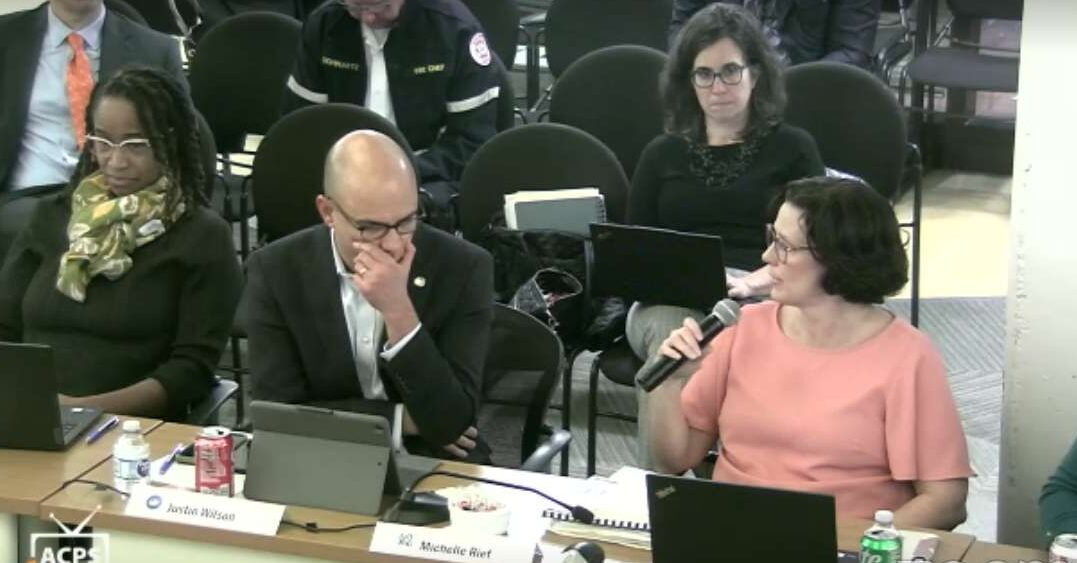
As Alexandria’s City Council and School Board work to reconcile their budgets, Mayor Justin Wilson scolded School Board leadership for not taking a longer view of budgets and planning.
Alexandria’s School Board is asking for $21 million more than it received in the previous budget — for a total of $384.4 million — with School Board members adding $10 million in additions to Superintendent Melanie Kay-Wyatt’s proposed budget. City Manager Jim Parajon fully funded the Superintendent’s budget, but did not include funding for the additional $11 million requested by the School Board.
The issue started with 1703 N. Beauregard, a swing space building to be used for George Mason and Cora Kelly students while those schools undergo renovation. But as the School Board asks the City Council for more funding to address capacity issues, Wilson said it’s frustrating not to see a longer term plan for what happens to that building after it’s finished as a swing space in 2029.
“I want to be able to tell people 1703 N. Beauregard is going to be swing space and then it’s going to be this, whatever this is,” Wilson said. “I saw from staff they say it’s going to be a middle school, you [School Board chair Michelle Rief] say it’s going to be Chance for Change, I hear from other board members it might be an elementary school.”
Wilson said that the City Council, which is dealing with its own budget woes, needs to see a clearer vision from the School Board as the two bodies collaborate on long-term planning.
“At some point, the Board needs to make a long-term set of decisions bout how we’re going to configure and align capacity,” Wilson said. “I recognize things are going to change and we need to evolve and adapt, but we need a direction. It can’t be nine people saying ‘maybe we will do this’ but we need to make decisions.”
Rief answered that the School Board is hesitant to plan too far in advance given how quickly some of the major issues can change.
“If you look back at 2019, we didn’t know the pandemic was going to hit,” said Rief. “We don’t know what’s going to happen with the arena deal. I remember back when we had this conversation in November, you were asking about how we plan after ten years… When you get beyond five to seven years it gets harder to plan. I think situations and circumstances change.”
Wilson called Rief’s answer “unacceptable”:
The answer that we can’t plan past five or seven years is not an acceptable for me. We have to. We have to figure that out.
These are generational investments. We are spending a generational amount of money. It takes us five to seven years in order to even plan and budget for a project of this size.
Think about how long Minnie Howard was in the plan. Think about how long Douglas MacArthur was in the plan. The MacArthur funding, which just opened, was a decision we made in 2016.
This stuff takes a long time. I agree that we have to be flexible and adapt and change, but we need to at least have a vision for what this is going to look like.
If you’re expecting us to raise billions over a period of time, we need the runway to be able to do that.
Battles between the two governing bodies, particularly over the budget, aren’t uncommon.
When it came to cost cutting, the Alexandria City Public Schools (ACPS) said one of the biggest areas schools could cut is on “green building” initiatives. The tradeoff there, staff said, is that what’s gained in capital funding may be lost in long-term operating costs.
“The expectation is that we are meeting the City’s Green Building policy and Net Zero… we cannot do that with a $20 million reduction,” Kay-Wyatt said.
ACPS staff said geothermal wells could be removed from new schools, saving millions in capital costs, but it’s unclear how that would impact long-term operating costs.
While those cuts to the environmental efficiency of the buildings would still need to be studied and considered, City Council leadership said the top priority in those buildings needed to be on providing educational space.
“When we’re talking about schools and sustainability and green buildings and how much those things cost,” Vice Mayor Amy Jackson said, “I’ll be the other side right now and say: our education of our kids is really what the need is in these buildings; first and foremost.”
(Updated at 4:30 p.m.) With a handful of schools exceeding 110% utilization, the Alexandria School Board is moving forward with a lengthy redistricting process to redraw elementary and middle school boundaries.
The School Board, which is now starting its redistricting process from scratch, wants any changes to go into effect at the beginning of the 2026-2027 school year, according to School Board Vice Chair Kelly Carmichael Booz.
On Tuesday, the ACPS Redistricting Steering Committee held a work session to map out its priorities, which include capacity reassignments in schools, as well as a balanced distribution of students riding on buses and participating in special programs.
“The new timeline right now is targeting the 2026-2027 school year, not 2025-2026,” Booz said at the meeting.
A number of elementary schools have more than 110% utilization, including John Adams, Mount Vernon, Patrick Henry, and Samuel W. Tucker Elementary Schools, according to a 2023 boundary analysis.
At the same time, enrollment at Cora Kelly, Douglas MacArthur, George Mason, and William Ramsay Elementary Schools is below 90%.
Alexandria City Public Schools is required by law to conduct a boundary analysis every five years or if a school opens. The analysis was initiated due to the opening of the new Douglas MacArthur Elementary School opened in August.
It’s been six years since the last shift of elementary school boundaries impacted approximately 1,351 students, according to ACPS. That 2018 redistricting was the result of a year-long process.
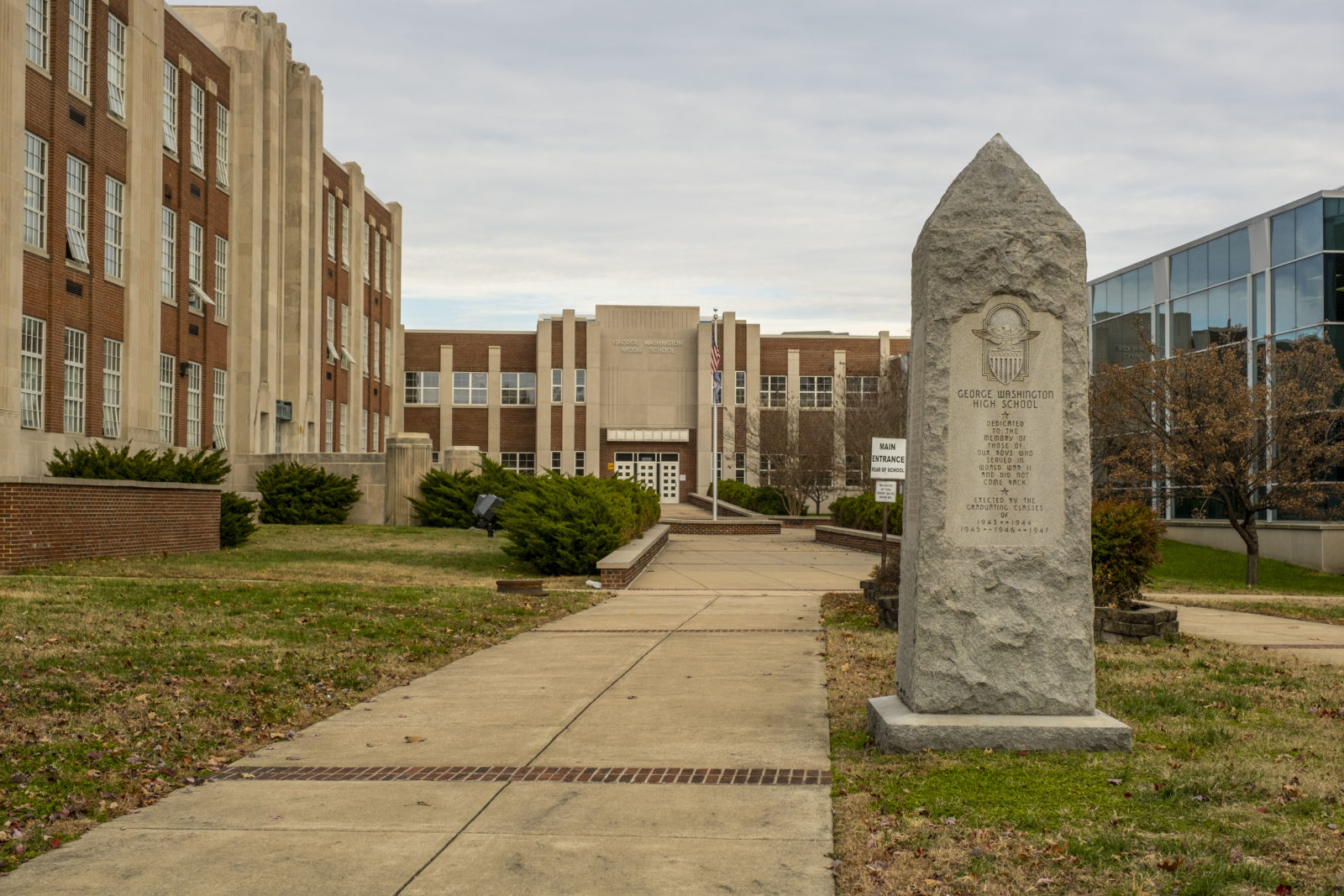
Twenty three Alexandria middle schoolers and eight Alexandria City High School students were arrested in the first two quarters of this school year, according to a report that the School Board will receive Thursday.
There were also 213 incidents requiring a police response, including five weapons-related incidents, 43 students needing EMS assistance, 56 fights/assaults and three reports of sexual assault.
Weapons seized include three stun guns/tasers, a pellet gun and a knife.
There were 17 students arrested in the first two quarters of the 2022-2023 school year (last year), and 41 arrested in the final two quarters, totaling 58 arrests and resulting in a 26% increase in students arrested over the previous school year.
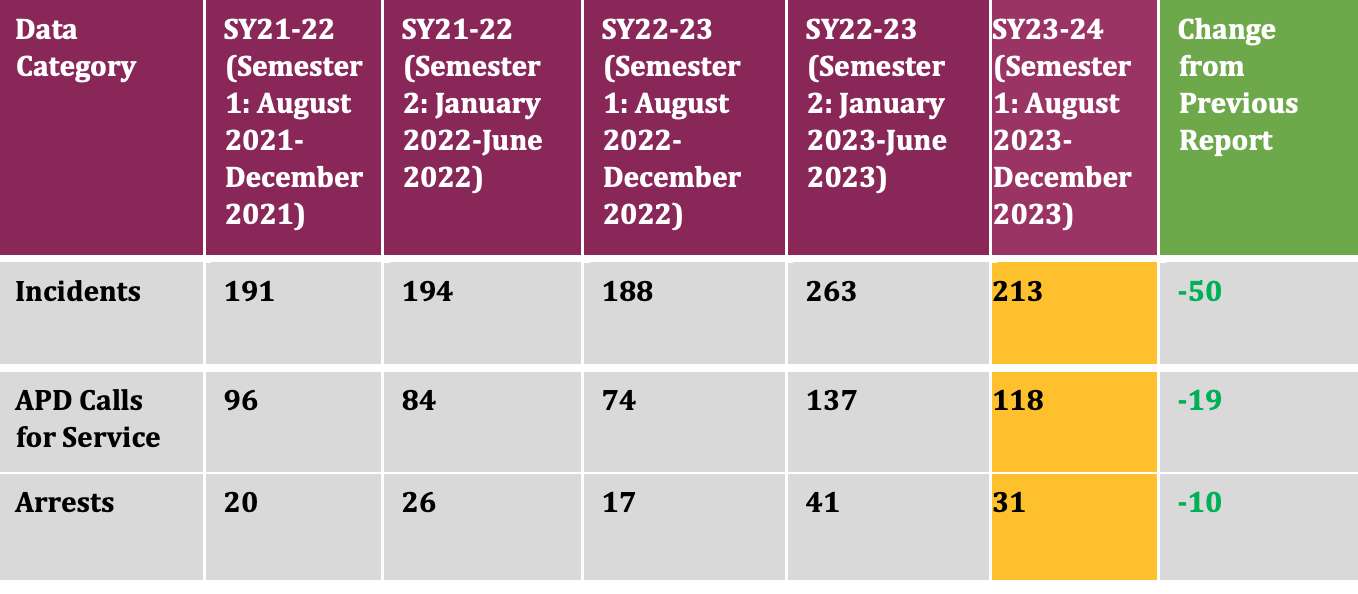
Of those arrested so far this year, 20 of them were Black students, making up 55%.
There were 95 incidents reported at the Alexandria City High School campuses, 70 incidents at the city’s two middle schools (Francis C Hammond and George Washington Middle Schools), 35 incidents at elementary schools and 13 incidents at K-8 schools.
There were also 118 police calls for service — 56 at the high school campuses, 46 at the middle schools, four at K-8 schools and 12 at elementary schools.
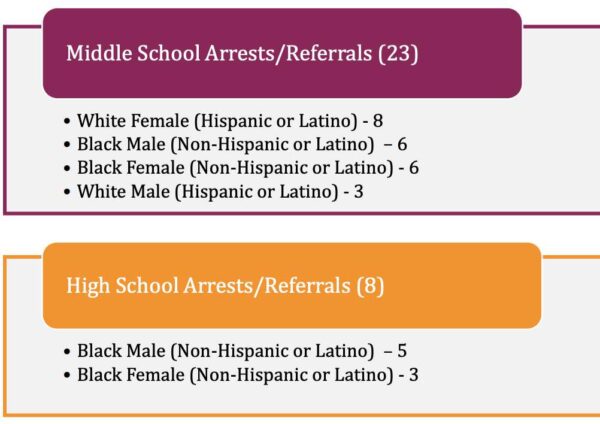
Incidents in the first semester of this school year include:
- 57 incidents characterized as “other” (including two students discussing weapons, four cases of disorderly conduct, two reports of public intoxication, one fraudulent 911 call)
- 56 fights/assaults
- 43 injuries that required medical assistance
- Five confiscated weapons
- Nine controlled substances
- Nine threats (verbal/cyber/social media)
- Six missing student reports
- Four reports of suspicious activity
- Three alarms pulled
- Three reports of sexual misconduct
- Six thefts
- Seven reports of possessing prohibited materials
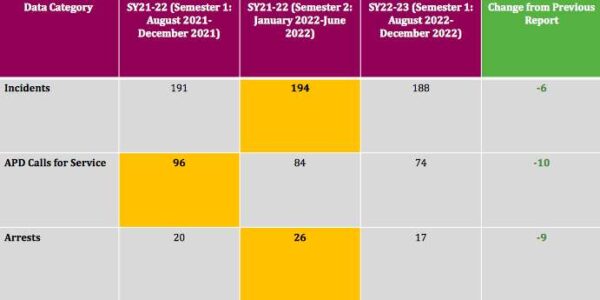

The Alexandria School Board unanimously authorized starting the collective bargaining process with its teachers and licensed staff Thursday night, kickstarting an extensive period of negotiation on employee rights, wages and benefits.
A number of Alexandria teachers an union representatives voiced their displeasure, however, with stipulations in the ACPS draft collective bargaining resolution.
The 17-page document states ACPS will bargain with an employee organization if 30% of those bargaining employees (also known in groups as “units”) endorse it. The draft resolution also outlines rules for a three-year agreement that would cover four yet-to-be-identified topics. After the agreement expires three years later, two additional topics could be added for negotiation. Topics covered could include wages, benefits and terms and conditions of employment.
“We want a normal, democratic election without an election participation threshold,” said Dawn Lucas, president of the Education Association of Alexandria (EAA).
Last October, EAA started the collective bargaining process by sending the Board an employee certification submission on behalf of all licensed teachers. That submission gave the Board 120 days to authorize the collective bargaining process by Feb. 13. A full board action on the resolution is anticipated to occur on Thursday, March 21.
School Board Chair Michelle Rief said that she anticipates a future public hearing dedicated to the collective bargaining resolution.
“This has been a long time coming, for sure,” Rief said. “At the end of the day we really want our teachers to know that we value you.”
ACPS is currently experiencing a staffing crisis, and James Rutigliano, a second grade teacher at Jefferson-Houston K-8 School, said that without an agreement that he and other teachers will quit.
“Talented teachers will not come to ACPs if they feel their labor, ideas, and work product will be exploited,” Rutigliano told the Board. “We must negotiate in good faith, and an election participation threshold is simply undemocratic. It tells our students and our community that the voice will only matter if and only if they hold power.”
The draft resolution also says that there will be two bargaining units, one made of licensed personnel (teachers, school counselors, specialists, librarians, school psychologists, social workers, speech pathologists, department chairs, and 10-month, 11-month, and 12-month Licensed Personnel) and a second unit made up of “education support professionals.” Administrative employees are not included in the draft agreement. They include principals, assistant principals and supervisors.
Rief said last month that the school system wants to reach a collective bargaining agreement by the end of this calendar year. Such a deadline means that any major changes to staff benefits and compensation could be realized with next year’s passage of the Fiscal Year 2026 budget.
School Board Member Tim Beaty, a former leader with the International Brotherhood of Teamsters, won a recent special election by mostly campaigning on the importance of collective bargaining. He said that it might be helpful for EAA and the School Board to discuss the school system’s needs in a meeting.
“I’m persuaded by the arguments that were made that it would be helpful to have a direct conversation between the Board and the EAA about the draft resolution,” Beaty said.
Lucas said that it feels as if the needs and desires of her members were not considered when ACPS created the draft resolution. She said that the association wants bargaining rights for all employees, including licensed staff, support staff, and administrators.
“All employees deserve bargaining rights,” Lucas said. “We want the right to bargain over the many topics related to our working and learning conditions, including current policies, regulations, procedures and practices. If we are unable to bargain over the terms and conditions of employment, there is very little, if anything, left to bargain.”
Alexandria approved collective bargaining in 2021, after former Governor Ralph Northam announced the law in 2020. It took the city nearly two years to negotiate a collective bargaining agreement with police and firefighters.
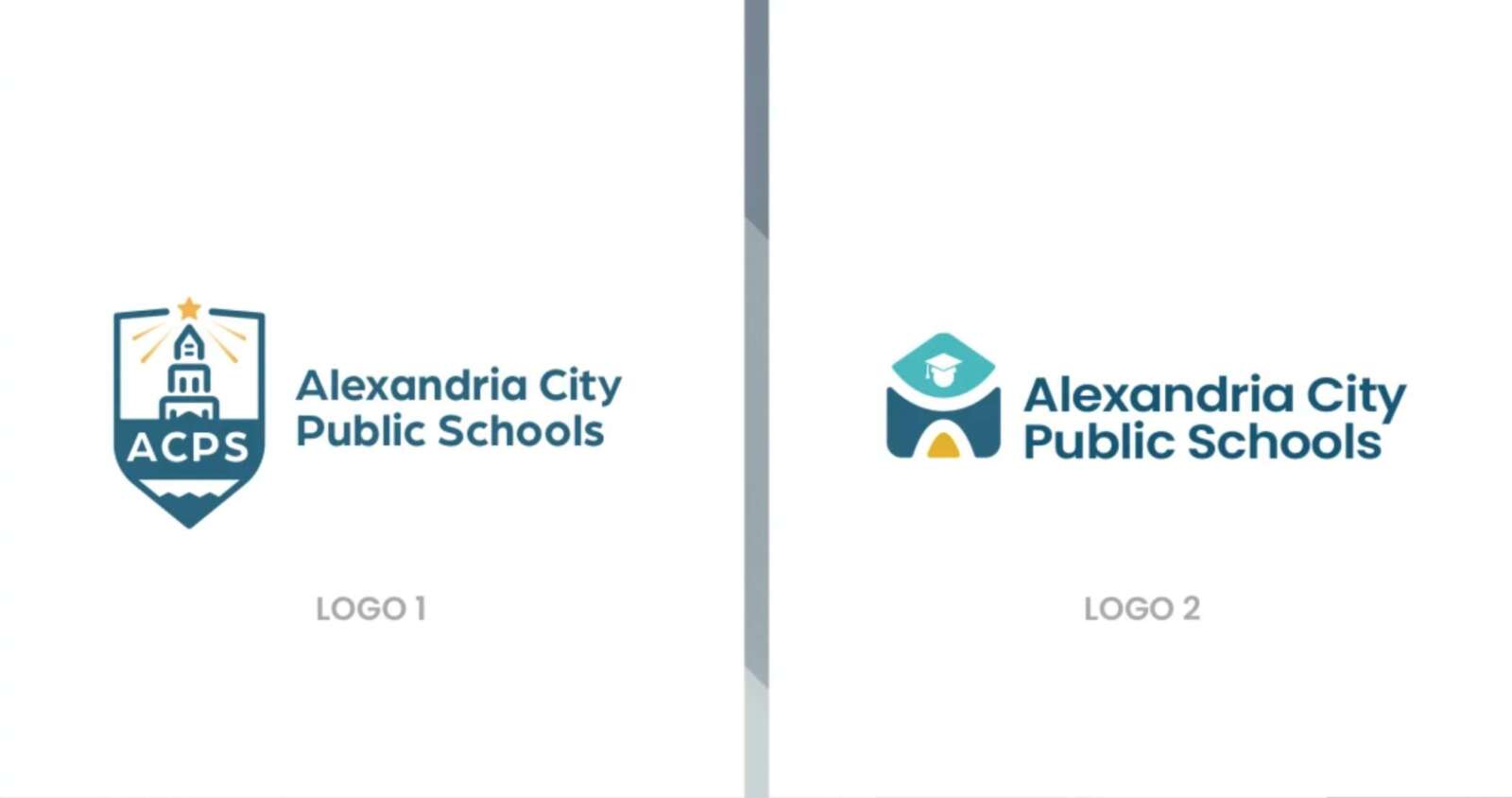
Two years after the School Board requested a new logo for Alexandria City Public Schools, rejecting an initial replacement, Superintendent Melanie Kay-Wyatt came back with a new logo recommendation earlier this month.
In a 5-3 vote, the School Board also rejected the new logo design.
The proposed logo featured the George Washington Masonic National Memorial, but drew criticism from some on the School Board who noted that the building, which honors George Washington and is styled after the Lighthouse of Alexandria, is more representative of the city’s past than its future.
Neither of the proposed logos were particularly popular on ACPS’ social media channels.
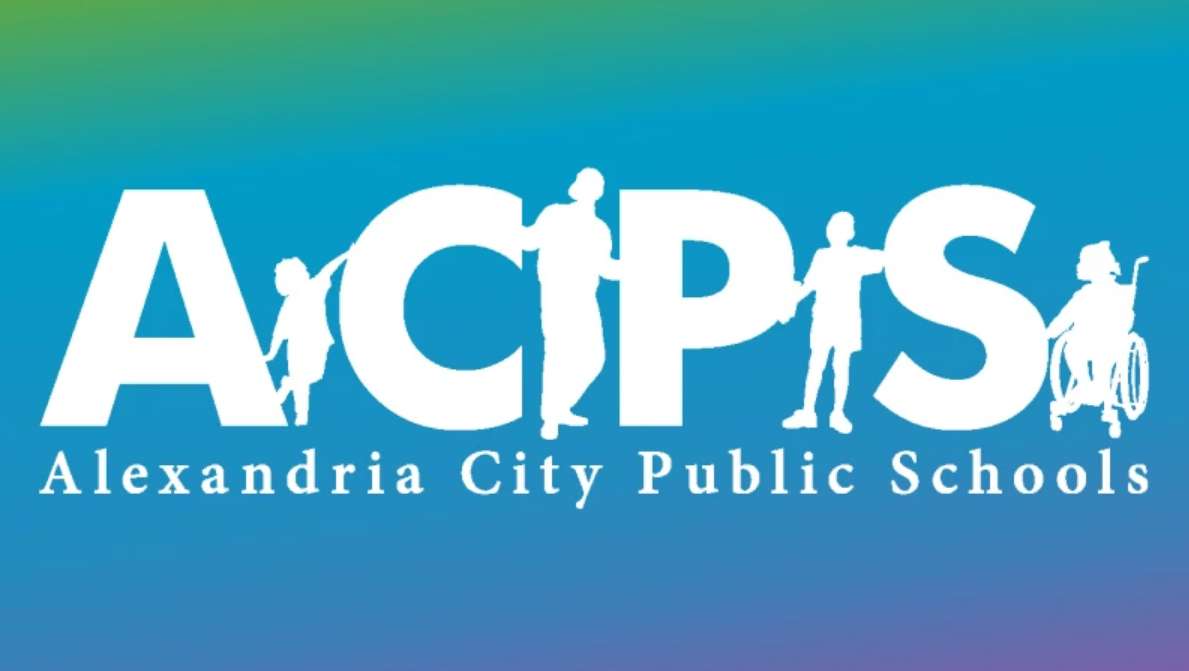
School Board member Meagan Alderton, however, said the logo fight is a distraction from meaningful work on addressing issues of racism and discrimination in the school system.
“While I appreciate all these symbolic discussions, I would love for people to start walking into this Board room and get on our case and blast us on that equity dashboard,” Alderton said. “That is the real work on racism. We have all these other little things that become distractions. It is 100% a distraction to the work, and I believe, at this point, it is a tactic.”
Abdel-Rahman Elnoubi proposed that the current logo be left in place, tabling the logo discussion indefinitely, but the School Board ultimately voted for Superintendent Melanie Kay-Wyatt to return to the School Board with additional logo designs for the School Board to vote on.

